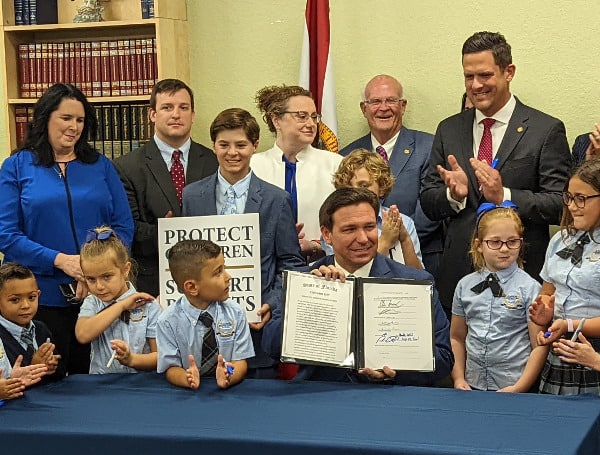
A federal appeals court has put on hold a battle about a 2022 Florida law that restricts instruction about gender identity and sexual orientation in schools, after attorneys said they were in settlement talks.
The 11th U.S. Circuit Court of Appeals last week issued a stay of an appeal filed by students, parents and teachers after a federal district judge in February rejected their constitutional challenge to the high-profile law.
The stay came after a joint motion filed Aug. 15 that said the parties were “engaged in active settlement discussions.”
“Should the parties’ settlement discussions no longer appear to be productive, any party may withdraw its consent to the stay by filing a notice with the court,” the joint motion said.
In the news: Florida Gov. DeSantis Calls For Full Transparency Of 9/11 Plot, Says Families Deserve To Know
Last week’s order directed the parties to file status reports every 60 days starting Oct. 2.
The documents did not provide details of behind-the-scenes discussions among the parties. But the case centers on a measure that Republican legislators called the “Parental Rights in Education” law — and opponents labeled the “don’t say gay” bill.
The law, which has drawn national attention, prevented instruction on gender identity and sexual orientation in kindergarten through third grade and required that such instruction be “age-appropriate … in accordance with state academic standards” in older grades.
The Republican-controlled Legislature and Gov. Ron DeSantis went further this year by approving a bill to broaden the prohibition on instruction about gender identity and sexual orientation to pre-kindergarten through eighth grade.
Plaintiffs in the appeal are three LGBTQ students and 11 parents and teachers from areas such as Broward, Manatee, Miami-Dade, Orange, Pasco and St. Johns counties. Also, the LGBTQ-advocacy group Family Equality is a plaintiff.
The lawsuit alleges violation of First Amendment and equal-protection rights and of a federal law known as Title IX, which bars discrimination based on sex in education programs.
In the news :Kevin McCarthy To Throw Support Behind Impeachment Inquiry Into Biden
But U.S. District Judge Allen Winsor in February ruled that the plaintiffs had not “alleged sufficient facts” to show they had legal standing to challenge the law. Winsor also had rejected an earlier version of the lawsuit.
“Plaintiffs have shown a strident disagreement with the new law, and they have alleged facts to show its very existence causes them deep hurt and disappointment,” the Tallahassee-based Winsor wrote in the February ruling. “But to invoke a federal court’s jurisdiction, they must allege more. Their failure to do so requires dismissal.”
But in a brief filed May 31, attorneys for the plaintiffs contended that Winsor erred in dismissing the case and sought to show that plaintiffs have suffered harm from the law.
“Simply put, the LGBT individual plaintiffs have personally experienced unequal and lesser treatment at the hands of teachers and officials who now restrict what they can say, read, hear, and wear,” the brief said. “That constitutes injury.”
Attorneys for the defendants — the State Board of Education, the Florida Department of Education and the school districts — have not filed a brief at the appeals court after receiving a time extension in June.
Meanwhile, Orlando-based U.S. District Judge Wendy Berger last month dismissed a separate challenge to the law filed by parents, students and a non-profit group. Berger’s ruling included a series of issues, including her conclusion that most of the plaintiffs had not shown legal standing.
As of Tuesday morning, Berger’s ruling had not been appealed, according to an online docket.
Android Users, Click To Download The Free Press App And Never Miss A Story. Follow Us On Facebook and Twitter. Signup for our free newsletter.
We can’t do this without your help; visit our GiveSendGo page and donate any dollar amount; every penny helps
